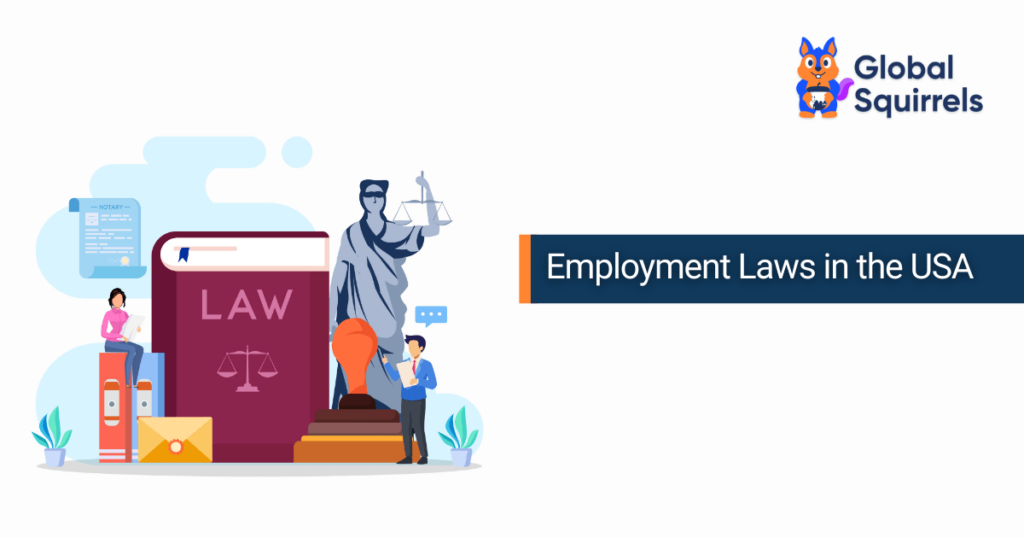Employment Laws in the USA: A 2025 Compliance Guide for Employers

Starting or expanding a business in the United States offers tremendous opportunity—but also comes with the critical responsibility of understanding and following U.S. employment laws. Failing to comply can lead to lawsuits, fines, reputational damage, or even business shutdowns.
In this guide, we’ll break down the key employment laws in the USA, how they apply to employers, what’s changed in 2025, and how to stay compliant across different states and employment models.
Why Employment Law Compliance Matters in the USA
Whether you’re a local startup, a multinational company, or hiring remotely across states, employment law compliance is non-negotiable.
- Legal Risk: Violating laws like the FLSA or EEOC rules can cost tens of thousands in penalties or settlements.
- Employee Trust: Workers expect fair treatment. Non-compliance leads to disengagement, high turnover, and union pressure.
- Business Reputation: Public lawsuits or fines can permanently damage your employer brand.
Key Federal Employment Laws Every Employer Should Know
1. Fair Labor Standards Act (FLSA) – Wage and Hour Law
- Federal Minimum Wage: $7.25/hour (as of 2025), but states may enforce higher rates.
- Overtime Pay: At least 1.5x regular pay for hours worked beyond 40 per week.
- Exempt vs. Non-Exempt: Employees must meet certain criteria to be exempt from overtime. Misclassification is a common violation.
Example: In California (2025), the minimum wage is $16/hour, and overtime kicks in after 8 hours/day—not just 40/week.
2. Family and Medical Leave Act (FMLA)
- Grants 12 weeks of unpaid, job-protected leave for:
- Childbirth or adoption
- Serious health conditions
- Military family needs
- Applies to companies with 50+ employees
3. Occupational Safety and Health Act (OSHA)
- Employers must provide a safe, hazard-free workplace.
- Required to:
- Post OSHA guidelines
- Train employees on safety
- Log injuries and illnesses
- Allow OSHA inspections without retaliation
4. Title VII of the Civil Rights Act & Equal Pay Act
- Prohibits discrimination based on:
- Race, color, religion, sex, or national origin
- Sexual orientation or gender identity (per 2020 Supreme Court ruling)
- Requires equal pay for equal work, regardless of gender.
Understanding At-Will Employment in the USA
Most U.S. employment is “at-will”, meaning either the employer or employee can end the employment at any time, for any legal reason.
However:
- You cannot fire someone for discriminatory reasons (race, religion, etc.).
- Some states recognize “implied contracts” or public policy exceptions.
- It’s still recommended to maintain clear documentation and performance reviews before termination.
Tip: Even in at-will states, wrongful termination lawsuits are common. Always consult legal counsel before firing.
Federal vs. State Employment Laws: What’s the Difference?
- Federal law sets the floor — the minimum standard.
- States can go beyond that floor to offer more protections.
Example Differences:
|
Topic |
Federal Law |
State Example |
|
Minimum Wage |
$7.25/hour |
California: $16/hour (2025) |
|
Paid Sick Leave |
No federal mandate |
New York: 40–56 hours/year depending on employer size |
|
Meal Breaks |
Not required federally |
California: 30 min unpaid after 5 hours of work |
Always follow the law that gives employees greater protection or benefits.
Employment Law for Remote Workers in the USA (2025 Update)
The rise of remote work has introduced new legal challenges.
Key Legal Areas for Remote Employees:
- Multi-State Compliance: If an employee lives in a different state, you must comply with their state’s labor laws.
- Tax Registration: May require you to register your business in that state and withhold local taxes.
- Wage & Hour Laws: Vary by state. Some require breaks, minimum hours, or reimbursements.
- Home Office Expenses: Some states like California require reimbursement for business-related expenses, like internet or cell use.
If your team is remote across multiple states, using an EOR (Employer of Record) or PEO platform like Global Squirrels can simplify compliance.
Other Essential Areas of US Employment Law
Health Coverage Compliance (ACA)
- Under the Affordable Care Act (ACA), businesses with 50+ full-time employees must:
- Offer affordable health insurance
- Meet coverage and affordability requirements
- Penalties apply for non-compliance
Penalties for misclassification include back wages, taxes, benefits, and fines.
Common Mistakes Employers Make with U.S. Employment Laws
- Misclassifying full-time workers as contractors
- Ignoring state-specific labor requirements
- Not paying overtime properly
- Poor record keeping (pay stubs, hours, breaks)
- Not providing written policies (harassment, leave, breaks)
Consequences of Not Complying with U.S. Labor Laws
Reputational Damage
- Public lawsuits or employee complaints can lead to bad press and customer backlash.
Employee Relations Breakdown
- Low morale, resignations, or unionization efforts are common when laws are ignored.
Financial Risk
- Legal penalties, back pay, fines, and settlements can cost millions.
- You may be forced to halt operations or lose licenses.
How to Stay Compliant with Employment Laws in 2025 and Beyond
- Stay Informed: Follow updates from the Department of Labor (DOL), EEOC, and state agencies.
- Consult Legal Experts: Work with labor attorneys or compliance advisors.
- Use a PEO or EOR: Staffing platforms like Global Squirrels help you:
1)Onboard U.S. workers
2) Manage payroll, taxes, benefits
3) Stay fully compliant across states
- Audit Regularly: Perform internal audits of classification, payroll, and documentation.
Conclusion:
Navigating employment laws in the USA is a challenge especially in a landscape where rules vary by state and change frequently. But with proactive planning and the right partners, you can stay fully compliant while building a high-performing, legally protected workforce.
Need help managing employment law compliance in the USA? Schedule a demo with Global Squirrels and streamline onboarding, payroll, and compliance today.
